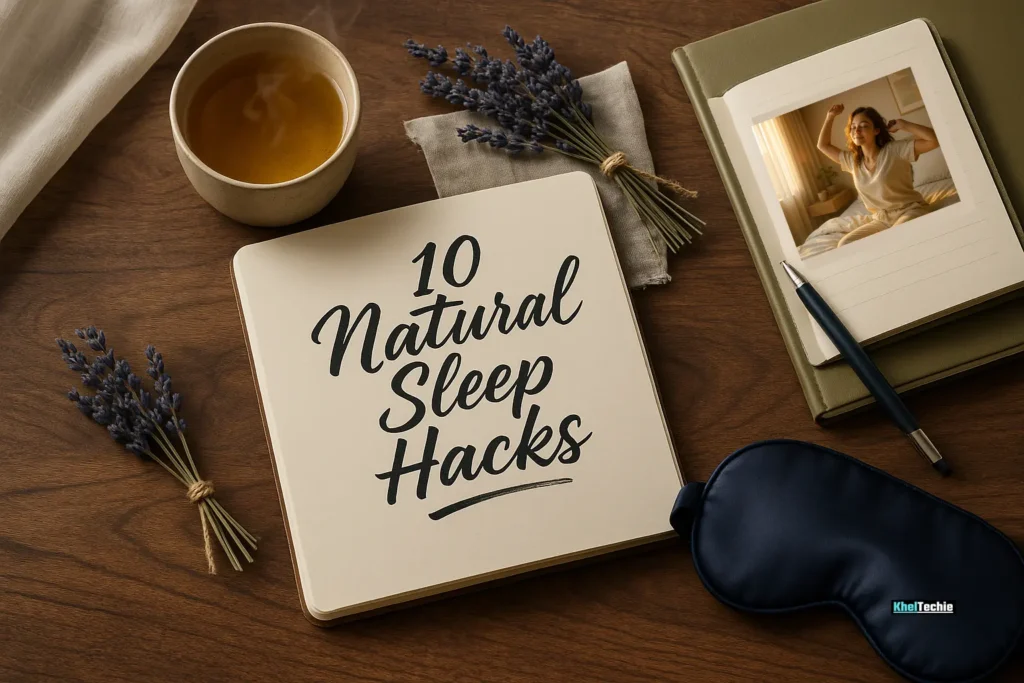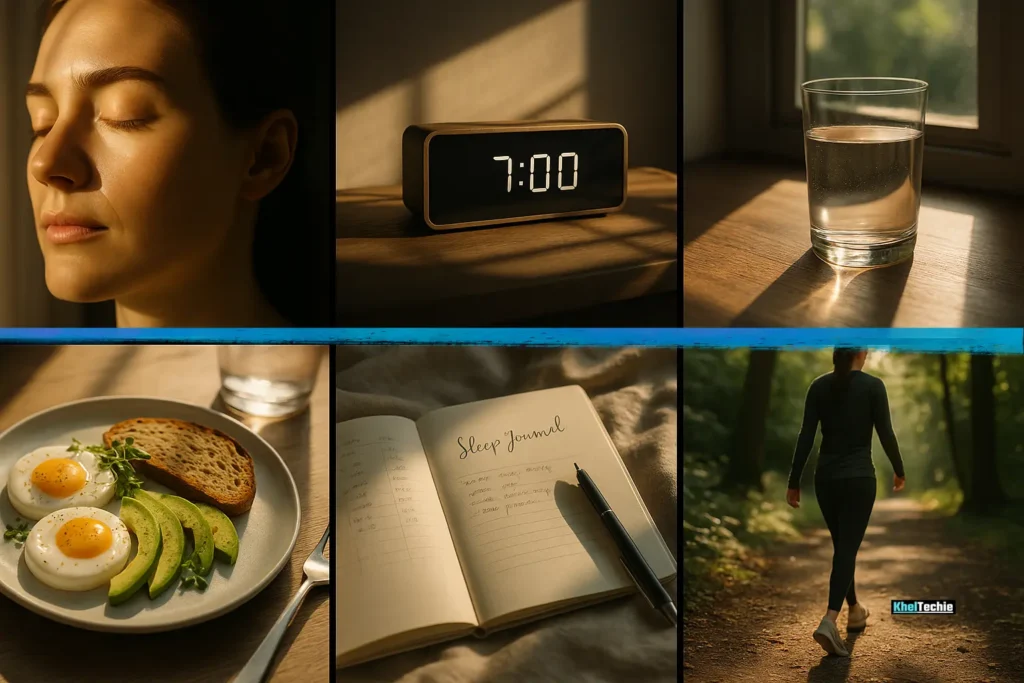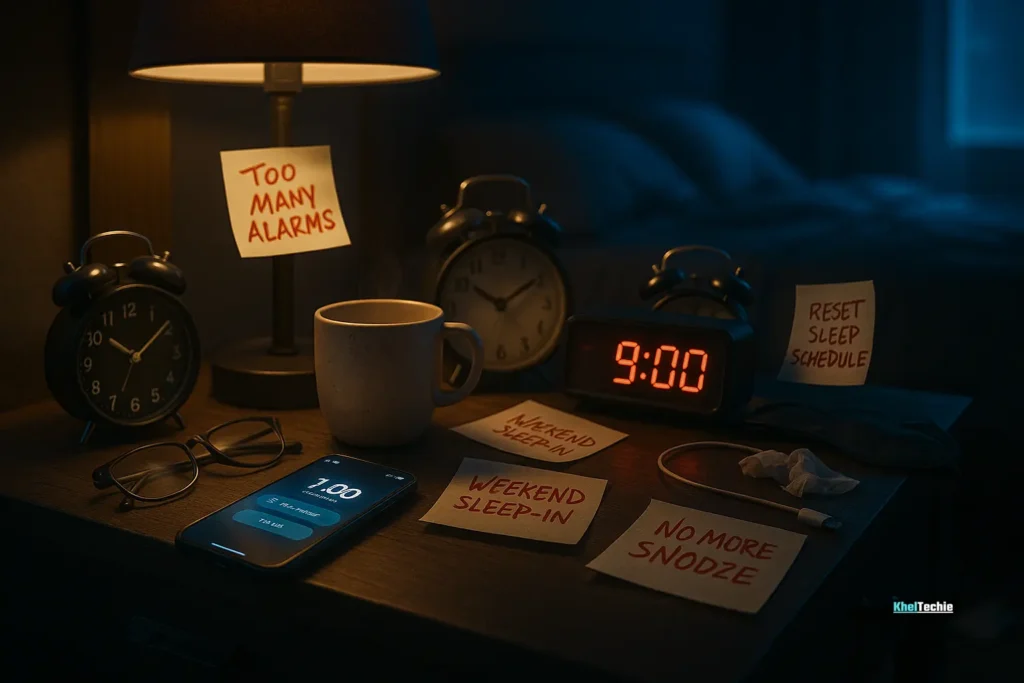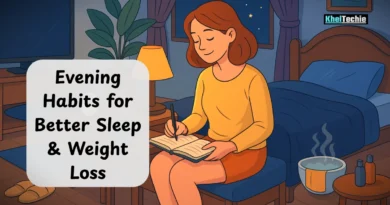10 Natural Hacks to Stop Oversleeping & Wake Up Energized Daily
Are You Trapped in the Snooze Button Cycle?
You set your alarm for 7 a.m., You meant to get up. But somehow, you wake up at 8:30 a.m., groggy, guilty and already behind. Sound familiar?
You’re not lazy, You’re not broken. But if you’re constantly oversleeping, even after 9 or 10 hours, something’s really off and it’s dragging down your energy, focus and mood.
The good news? You don’t need medication or extreme routines. There are 10 natural hacks to stop oversleeping that actually work without willpower wars or 5 a.m. ice baths. In this guide, you’ll discover science-backed, real-life-tested strategies to reset your sleep rhythm, boost energy and wake up feeling like you again. Let’s fix this naturally.
Also read – How to Create a Sleep Sanctuary at Home

What Is 10 Hacks to Stop Oversleeping Naturally?
Let’s break it down
Oversleeping isn’t just sleeping too long. It’s when you spend excessive time in bed, typically more than 9 hours and still feel tired. It’s a trap: you sleep more to feel better, but end up feeling worse. And here’s the twist: oversleeping is linked to depression, heart disease, diabetes and poor cognitive function, just like undersleeping.
So what does “naturally” mean?
No pills, No stimulants & No expensive gadgets, Just lifestyle tweaks, circadian rhythm hacks and behavioral shifts that align with your body’s biology.
And “10 hacks”? These aren’t random tips. They’re proven, step-by-step strategies used by sleep experts, therapists and people just like you who finally broke the oversleeping cycle.

Why Stopping Oversleeping Naturally Matters
You might think that more sleep is always better, but science says otherwise. Stopping oversleeping naturally isn’t just about gaining time in your day, it’s a smart step for your whole-body health and mental clarity. Sleep Foundation data shows a hard truth: lingering in bed habitually for 9 hours or more can set off a cascade of health complications. Not only does it increase your chances of diabetes, stroke and heart disease, but it may also disrupt your immune system and increase inflammation throughout your body. Even if those extra hours feel restful, they come with hidden hazards that build up in the background.
But the story doesn’t end with your heart and blood sugar. Oversleeping takes a hit on your brainpower, too. Recent research from UT Health San Antonio (May 2025) highlights that excessive sleep can cloud your focus, slow down memory and leave you feeling dull, effects that are magnified if you’re already dealing with depression or stress. Instead of feeling refreshed, you’re more likely to notice brain fog sneaking into your daily routine, making work, learning and even social interactions more difficult.
What’s truly unique is that these harms don’t just arise from poor lifestyle choices; oftentimes, oversleeping signals deeper issues like disrupted circadian rhythms or underlying emotional struggles. By reclaiming your natural sleep balance, favoring regular 7–9 hour nights, you’ll give your body and mind their best shot at healing and thriving.
In short, stopping oversleeping naturally gives you more than just hours back. It means a stronger heart, a sharper mind and a noticeable lift in your overall energy, mood & help you feel vibrant all day.
Ready to reboot your body clock and wake up feeling alive?

10 Hacks to Stop Oversleeping Naturally
Let’s dive into the 10 most effective, research-backed and easy-to-implement hacks. These aren’t quick fixes, they’re lifestyle upgrades that compound over time.
1. Fix Your Light Exposure (Morning Sun = Natural Alarm Clock)
Why it works:
Your brain uses light to set your circadian rhythm. Sunlight in the morning suppresses melatonin (the sleep hormone) and boosts cortisol (the wake-up hormone) naturally.
How to do it:
- Within 30 minutes of waking, get 10–15 minutes of direct sunlight.
- Open your curtains immediately.
- Walk outside, even in winter.
- No sun? Use a 10,000-lux light therapy lamp for 20 minutes.
Avoid sunglasses first thing & Let the light hit your eyes directly.
2. Set a Rock-Solid Wake-Up Time (Even on Weekends)
Why it works:
Your body loves consistency. When you sleep in on weekends, you create social jet lag, a mismatch between your internal clock and your schedule.
How to do it:
- Pick a fixed wake-up time (e.g., 7:00 a.m.).
- Stick to it 7 days a week, no exceptions.
- Adjust bedtime gradually to match.
If you currently wake at 10 a.m. on weekends, move it back 15 minutes every 2–3 days until you hit your target. First Try to fix your Wake time, Wake time is more important for resetting your rhythm.
3. Make Your Bedroom a Sleep-Only Zone
Why it works:
If you work, scroll or watch TV in bed, your brain associates your bed with alertness, not sleep.
How to do it:
- No phones, laptops or TV in bed.
- Use your bed only for sleep and sex.
- Charge your phone in another room.
- Read a book (paper, not tablet) if you can’t sleep.
Keep your room cool (60–67°F / 15–19°C).
4. Ditch the Snooze Button (Seriously, Delete It)
Why it works:
Hitting snooze causes sleep fragmentation, short bursts of light sleep that leave you groggier than if you’d just gotten up.
How to do it:
- Place your alarm across the room.
- Use an app like Sleep Cycle or Alarmy that makes you solve a puzzle or take a photo of your sink to turn it off.
- Commit: “When the alarm goes off, I get up, even if I don’t feel like it.”
Tell yourself: “I don’t have to be happy, I just have to get out of bed.” Action precedes motivation.
5. Hydrate & Move Within 5 Minutes of Waking
Why it works:
Dehydration worsens grogginess & Movement signals your body: “Day has started.”
How to do it:
- Keep a glass of water by your bed.
- Drink it immediately upon waking.
- Do 5 minutes of light movement: stretch, walk, jump rope, or yoga.
Sample routine:
- Sit up → drink water
- Touch toes, shoulder rolls, neck stretches (2 min)
- Walk around the house or do 10 squats
Morning hydration and light exercise improve alertness
6. Eat a Protein-Rich Breakfast (No Skipping!)
Why it works:
Low blood sugar after a long fast causes fatigue. Protein stabilizes energy.
How to do it:
- Eat within 1 hour of waking.
- Choose high-protein, low-sugar options:
- Eggs + avocado
- Greek yogurt + berries
- Protein smoothie (no added sugar)
- Avoid sugary cereals or pastries, they cause crashes.
Add healthy fats (nuts, olive oil) for sustained energy.
7. Track Your Sleep (But Not Obsessively)
Why it works:
You can’t fix what you don’t measure. But don’t get stuck in data.
How to do it:
- Use a simple sleep journal or app (e.g., Sleep Cycle, Pillow).
- Track:
- Bedtime
- Wake time
- How you feel (1–5 scale)
- Look for patterns over 1–2 weeks.
What to watch for:
- Frequent awakenings
- Long time to fall asleep
- Waking up unrefreshed
Avoid Checking your sleep score every morning, that causes anxiety.
8. Cut Evening Screen Time (Blue Light Is the Enemy)
Why it works:
Blue light from phones, TVs and laptops blocks melatonin by up to 50%, delaying sleep onset.
How to do it:
- No screens 1 hour before bed.
- Use night mode (but it’s not enough).
- Replace scrolling with:
- Reading (paper book)
- Journaling
- Light stretching
- Listening to calm music
Use blue light blocking glasses (like Swannies or Feliz) if you must use screens.
9. Get Natural Light During the Day (Especially Midday)
Why it works:
Daylight exposure, especially around noon strengthens your circadian rhythm and improves nighttime sleep.
How to do it:
- Take a 15–30 minute walk during lunch.
- Eat lunch outside.
- Work near a window.
Science: People who get 30+ minutes of daylight during the day fall asleep faster and sleep more deeply at night.
Even on cloudy days, outdoor light is 1,000–2,000 lux, much brighter than indoor lighting (~500 lux).
10. Address the Emotional Roots (Depression, Anxiety, Boredom)
Why it works:
Oversleeping is often a coping mechanism. If life feels overwhelming or meaningless, your brain may resist waking up.
Ask yourself:
- Am I avoiding something?
- Do I dread my day?
- Do I feel hopeless or low energy?
Solutions:
- Talk to a therapist (try BetterHelp or Talkspace).
- Journal your feelings each morning.
- Set one small, meaningful goal for the day.

Common Mistakes to Avoid And Why They Backfire
Even with the best intentions, people make mistakes that keep them stuck. Here are the top 5 oversleeping traps and how to avoid them:
| Mistake | Why It Fails | Better Approach |
|---|---|---|
| Sleeping in on weekends | Resets your clock, causes Monday fatigue | Same wake time every day |
| Using multiple alarms | Fragmented sleep = groggier | One alarm, across the room |
| Drinking coffee in bed | Reinforces “bed = awake” | Drink coffee standing up |
| Blaming yourself | Creates shame, not change | Focus on systems, not willpower |
| Ignoring mental health | Oversleeping may be a symptom | Seek support if needed |
Also read – Evening Habits for Better Sleep and Weight Loss

Final Thoughts: You’re Not Broken, You’re Just Mis-aligned
Oversleeping isn’t a failure, it’s a mismatch between your lifestyle and your biology. The 10 hacks in this guide aren’t about forcing yourself to wake up earlier, they’re about aligning with your natural rhythm, so waking up feels easy, not exhausting.
It’s not about torture, it’s about building sustainable, easy habits. Now it’s your turn: try one tip today, track your progress and drop a comment below sharing what worked for you! If you know someone stuck in morning snooze-mode, share this post to help start their day right.
This content is for informational purposes only and does not constitute medical advice. Always consult a qualified healthcare provider before making changes to your sleep habits or treating any sleep-related condition. Individual needs may vary.
FAQs: Your Top Questions Answered
Why do I oversleep even when I go to bed early?
Oversleeping can be due to poor sleep quality—fragmented sleep, blue light exposure, or underlying issues like sleep apnea or depression. A routine and environment check are key.
How long is too much sleep?
For adults, sleeping >9 hours regularly is considered oversleep; >10 hours is chronic and might carry health risks.
Does taking a nap worsen oversleeping?
Long or late naps can delay your core sleep onset. Keep naps ≤20 minutes and before 3 PM.
Are natural wake-up lights effective?
Yes—light alarms gently boost cortisol and simulate sunrise. Better than an abrupt alarm that jars you awake.
What if I feel groggy waking up?
Avoid snooze, get light exposure, hydrate, and move. A cold splash of water helps. See above hacks.
Can diet affect oversleeping?
Yes. Avoid caffeine and alcohol in late afternoon/evening. Eat nutrient-rich meals to support neurotransmitter balance.
How long until these hacks work?
Consistency is key. You may notice improvement in 1–2 weeks, but full circadian adjustment can take 2–4 weeks.
What environmental fixes help most?
Cool room (~65°F), blackout curtains, noise control, tech removal—prioritize these and tune the rest as needed.
When should I see a doctor?
If you regularly sleep >10 hours, feel unrefreshed, or struggle day-to-day. Underlying causes like sleep apnea, depression, or thyroid issues may require medical treatment.
Does exercise help stop oversleeping?
Yes—but timing matters. Morning or afternoon exercise strengthens your rhythm. Avoid intense workouts within 3 hours of bedtime.




